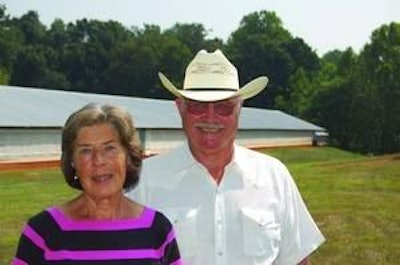
Townsends Inc. markets certified organic chicken under the Pristine Cuisine brand. The company started producing organic broilers back in 2001, and the program has been growing at a "healthy pace," according to Jeff Miller, complex manager, Townsends Inc. This growth has opened opportunities for some contract producers, like John and Rachel Etchison, to switch from raising conventionally produced broilers to raising organic birds.
The Etchisons said that they were on a waiting list to join the organic program when they made the switch in January of 2007. They have been raising broilers on their farm, which is just outside of Siler City, N.C., since their three 42-foot by 400-foot broiler houses were built late in 1987. John and Rachel purchased their 28-acre farm in 1973. John said that they saw the broiler houses as a means of providing income that would allow them to quit their regular jobs and "retire" to the farm. "Broilers were the only thing you could count on," he said. John worked his first career in banking and Rachel was a school teacher for 28 years, but they had always wanted to stay on the farm.
Rachel does most of the daily chores in the broiler houses while John tends to the couple's 50 head of brood cows which graze on their own land and on 200 leased acres. She said that she must sign for all feed deliveries and that the feed bins are locked to prevent the introduction of feed from any other source. The Etchison's farm is also audited on an annual basis. Rachel said that she was given training by Townsends and a notebook on all of the practices and record keeping that she must follow. The only changes to the houses were the switch to translucent curtains and provisions made for the birds to have access to the great outdoors.
Besides all of the record keeping and auditing, the biggest difference between organic production and conventional broiler production for the Etchisons has been reduced density and increased downtime. In compliance with National Organic Program standards, the broilers are placed at 1.5 square feet per bird in the Etchisons' houses. The downtime between organic flocks has averaged four weeks, versus two weeks that had been typical with conventional flocks, according to John Etchison. Because of the lower density and increased downtime, Miller reports that organic housing yields only 42 percent of the pounds in a year that housing on Townsends' conventional growing program produce.
This reduced tonnage, coupled with the fact that there may only be one organic grower's birds selling in a given week, mean that the growers participating in the organic program are paid on a payment per square foot basis and not on a more traditional competitive contract. John Etchison said that there is also bonus opportunity for growers based on livability of the organic flock and condemnation rates at the plant.
Higher costs per bird
Miller said that the grower cost per pound of meat produced is roughly 2.5 to three times greater for organic broilers than for conventionally produced broilers. Certified organic poultry must be fed rations formulated with organically grown feedstuffs. Miller said that some of the grains used in Townsends' organic broiler diets are grown in North Carolina, but that most of the ingredients are sourced from greater distances away. He said that organic feed costs twice as much as the traditional diet.
There is one disadvantage for growers raising organic birds, according to John Etchison. Since there are fewer birds on the farm, there is also less manure. He has used the farm's broiler litter to fertilize the pastures for the cattle, and even with cleaning out the houses completely once a year, he reports that he is now a little short on manure. The Etchison's do such a good job managing their farm that they were recently named finalists in the North Carolina Poultry Federation's Grower Environmental Awards competition.
Miller said that Townsends has an antibiotic-free program in addition to its organic program and that the antibiotic-free program is larger than the organic program. He characterized the growth of both programs as being "healthy."


















